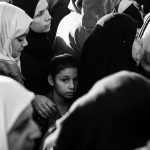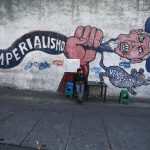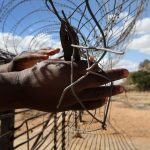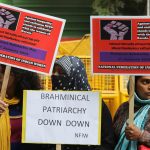Activist Robin DG Kelley on freedom in Palestine
Although dispersed globally, Palestinians have a sophisticated vision of what a free Palestine looks like, says scholar, writer and activist Kelley.
Author:
29 March 2019

There is a notion that every so often hope and history will coincide. The idea is perhaps most beautifully expressed in Seamus Heaney’s The Cure at Troy, the relevant stanzas going:
Human beings suffer,
They torture one another,
They get hurt and get hard.
No poem or play or song
Can fully right a wrong
Inflicted and endured.
[…]
History says, don’t hope
On this side of the grave.
But then, once in a lifetime
The longed-for tidal wave
Of justice can rise up,
And hope and history rhyme.
So hope for a great sea-change
On the far side of revenge.
Believe that further shore
Is reachable from here.
Believe in miracle
And cures and healing wells.
It is an appealing concept and one that I put to Robin DG Kelley, the scholar, writer and activist who visited Johannesburg this month as a guest of the Palestine Solidarity Campaign. Will there – can there – be a happy intersection of Palestinian hope for statehood and history’s nod? After all, Palestinians seem powerless against the concentrated military strength of the Israel Defense Forces (IDF) and the adamantine attitude of Israeli politicians and their electorate to Palestinian statehood.
Related article:
“Palestinians haven’t got the news yet that there is no hope,” says Kelley. “They’re not waiting on the boycott, divestment, sanctions campaign to solve the issue. They’re not waiting on the collapse of Israel.
“Hope is an interesting concept. It’s not based on an expectation but on what’s possible and necessary for the survival of Palestinians as people.”
Bringing an end to the cellular society dividing Palestinians and Israelis is imperative, Kelley says. “There is no secret strategy against overwhelming odds, but occupation is costly,” he says. “Israel is helped by the US, which is spending so much in financial and military resources that to create conditions of peace is impossible. Gaza and West Bank violence will continue.”
And indeed, in the week after Kelley was in conversation at the University of the Witwatersrand about “Resistance, History, Palestine, Imagination, Hope, Intersectionality, Racial Capitalism, Jazz, Solidarity,” a rocket into Israel was met by retaliatory Israeli airstrikes on Gaza.
Yet such escalations sow not so much the seeds of pessimism as the blooms of optimism. That’s because, Kelley says, “Israel is creating the conditions for the single state that the Popular Front for the Liberation of Palestine and Hamas have called for since 1962.”
‘Two states to one state to no state’
That’s a startling statement at first. Kelley explains: “A single state could be read as a sign of the dominance of Israel. But open up the possibility of a single state and, viewed like that, it’s not hopeless; it can be pretty optimistic.”
The question that comes to mind first is when this could happen. More pertinent, says Kelley, is another question: Where are the Palestinians? “Most don’t live there; they are the largest dispersed community. Part of the global character of their struggle is that Palestinians are globally situated.”
There is a sense that the sort of state that Palestinians in exile would most desire is a progressive, socialist, social democratic state – not necessarily the type of state to which Hamas and the Popular Front for the Liberation of Palestine might aspire.
Related article:
That any future developments will occur in a single state is almost inevitable, says Kelley. When the Israeli and Palestine Liberation Organization leaderships met in Oslo, Norway, the upshot was that “Oslo proved a two-state solution was impossible. It would have policed Palestinians on behalf of Israel … if you go back further you recognise that so much of the struggle, back to 1948, was a push to turn a British mandate into a sovereign state for all its people, not into a Jewish state, which many anti-Zionist Jews did not support.”
But what of Israeli President Benjamin Netanyahu’s recent declaration that “Israel is the nation state of the Jewish people – and only it”?
Kelley says bi-national states are possible, within which there would exist different ways of thinking about citizenship in one state. And also that “the side with the most radical activists and thinkers has moved from two states to one state to no state”.
Reconsidering borders
He references Huey Newton, the Black Panther activist, being interviewed after his release from prison and talking about national liberation. It’s accepted that the world is dominated by the United States propping up regimes and crushing foes. Newton urged thinking beyond that, fighting the US empire for socialism and rethinking national boundaries. It is with reconsidering borders that the “no state” idea kicks in.
“Palestine was under the Ottoman Empire, then the British Empire, then a British mandate. Imperial powers seized bits of Egypt, ‘invented’ Jordan. Natural territorial integrity is itself a historical thing.
Related article:
“Palestinians are intelligent and hold on to a deep political imagination and reject the knee-jerk ‘Palestine for the Palestinians’. They want to restore land, a right of return, a new beginning, reconciliation, not going back to the old ways. They rethink the economy, social relations. In refugee camps they are thinking what does a free Palestine look like?”
One thing about that musing seems certain: “They don’t want a free Palestine to look like what is perceived to be a democratic South Africa.”
Kelley elaborates. “One should not be surprised by the ANC harbouring neoliberal ideology. South Africa is forced by the West to play the game and at what cost? Give up global investment or not. What are you willing to give up or do to maintain a social democracy based on the promise of a social wage, housing, that you won’t take away even if it means sacrificing parts of the economy?”
The determination of women
Perhaps an even more tantalising question is what freedom for Palestinians might look like. This is a balance, says Kelley, of “anticipatory optimism in the face of revolutionary activism”. He cites as anecdotal evidence his experiences of the “universities of the refugee camps” and conversations with Palestinians throughout their territories.
“The discourse is indistinguishable whether you are talking to a 12-year-old or a 75-year-old. In the camps, the discourse is as high as at a university.”
There is, too, the potent female factor. “Older women, Muslim women, women associated with universities have a fiery determination. They say ‘You can take our water, kick us off the land, police us, shoot us without compunction. It can’t take away our determination. We keep coming back.’”
Related article:
“There is anger but there is joy, not despair. Apartheid and occupation don’t structure their daily life. Anger is in place of despair. It keeps alive the idea that what is happening is unjust, illegal, untenable and can’t be sustained for one day longer.”
But how do Palestinians, deprived of land and jobs, blockaded in Gaza and crowded into the West Bank, physically sustain themselves? They carry on with life: “They get jobs, make money, have agricultural cooperatives, collective economic practices, internal remittances and external, too.”
The key to it all is the “ideology of liberation” at the base of which is “a culture that says ‘My existence depends on belonging. When I confront the IDF or snipers and I die, my death is not in vain because it is on behalf of the struggle of my people.’”
Martyrs celebrated as heroes
Kelley talks about Ramallah, in which “pictures of martyrs are everywhere. Gravesites are really sacred places, with names of martyrs.” It is a “culture where people killed by occupying forces are celebrated as heroes”.
At the heart of it is the paradox that “life is so precious”. Kelley expands: “It’s not that death or martyrdom is precious. Life is precious. The importance of acknowledging that death is not an accident, that it is on behalf of this struggle that is going to continue.”
In the face of such resistance, why and how does Israel continue to oppose and suppress the Palestinians?
“It is a state of exception, Walter Benjamin’s idea. Xenophobia and fearmongering by the media and the state convince people that they need to be in fear and need to continue the hegemony.”
Many consequences flow from such a mindset. “There is no peace movement to speak of. The treatment of foreign and domestic policy shows that Israel is an outpost to protect US interests. In turn, if the US does not protect Israel, the unspoken thought is that it is continuing the Holocaust. So, it buttresses Israel … all forces are arranged to protect Israel.”
‘Rich intellectual tradition’
How then will Palestinians move toward the society that they are imagining?
There is the considerable effect of “oppression tourism”. Kelley describes “delegations seeing oppression”. His Palestinian friends say that people are moved by “oppression pornography and the spectacle of violence and violence against the innocent”. When Gaza was under siege, donations to charities increased.
Kelley’s experience, however, is very different. “My trips are not about seeing the violence. They are about sitting and talking to intelligent people – elderly stonemasons, soap makers, students, a 12-year-old on a bike. There is a rich intellectual tradition that imagines what’s possible.
“People are highly educated. Most are formally educated and also they are so open, cosmopolitan. This is the culture that birthed Christianity; but it has atheists, agnostics, Trotskyists, Marxists, feminists, Muslims.
“The Palestinian indivisibility of justice is a model for our futures and by ‘our’ I mean the world. It is a place of world-making.”
It is also “the place where colonialism exists in its most raw state”. But, to end with the hope that might one day rhyme with history, Kelley says it is “also here where its opposition is clearest and most sophisticated and visionary”.




